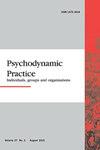女王之死——一个集体哀悼的机会
IF 0.4
Q4 PSYCHOLOGY, CLINICAL
引用次数: 0
摘要
我写这篇社论的时候,英国和世界各地的人们都在哀悼一位杰出的君主的去世。伯纳丁·毕晓普对莎士比亚的《李尔王与普洛斯彼罗》(2001)的精神分析研究,以及她对王室人物重要性的洞见。在我们努力走向成熟的过程中,王室人物代表了“我们对世界的责任份额的任何感觉”,以及“我们出生时所处的环境也属于我们自己”。因此,女王的去世提供了一个重要的机会,让我们哀悼气候变化、流行病、持续的战争以及我们的世界遭受的日益严重的核威胁所带来的创伤。这些创伤与本期一些论文的主题产生了共鸣。我们有一篇关于气候变化的文章和一篇来自乌克兰的会议报告,都是在乌克兰入侵之前写的。后一篇论文的作者在结尾处悲伤地承认,他们的论文标题包括“生与死”,指的是乌克兰精神分析社会的不稳定状态,不再是一个隐喻,而是成为他们日常生活的现实。Sally Weintrobe是气候变化论文的作者之一,她在7月份的一次在线政治思想系列演讲中,将新自由主义和促进冷漠社会与否认气候变化和核威胁的危险联系起来。西格尔(1987)写了一篇关于否认核威胁的开创性精神分析警告,并在本杂志的会议上发表了一篇关于核威胁的论文(西格尔,2003),该会议是为了回应迫在眉睫的入侵伊拉克而举行的。这篇论文概述了对核武器的焦虑是如何“将正常的对死亡的恐惧转化为对没有象征意义的灭绝的难以名状的恐惧”,以及我们破坏性的内部和外部证据如何导致精神防御,包括狂躁的必胜信念和自大狂。这场大流行病具体地提醒我们,我们对彼此造成了破坏性,我们在我们的文明中延续了生死不平等,在封锁的短暂一瞥中,我们污染和破坏了地球和自然世界。在我看来,乌克兰战争是又一次逃避战斗,逃避面对悲伤、悔恨的恐惧,逃避为彼此、为我们的星球采取补救行动的需要。三篇主要论文中的第一篇提醒我们集体哀悼的重要性,并在可能的情况下促进集体哀悼。《心理动力实践后的意义重构》,2022年第28卷第4期,333-336页,http://dx.doi.org/10.1080/14753634.2022.2133834本文章由计算机程序翻译,如有差异,请以英文原文为准。
Death of the Queen – an opportunity for collective mourning
I am writing this editorial as people in the United Kingdom and others across the world mourn the death of an exceptional monarch. Bernadine Bishop’s psychoanalytic study of Shakespeare’s Lear and Prospero (2001) and her insight about the significance of royal figures who, in our struggles to achieve maturity, represent ‘whatever sense we may have of our share of responsibility for the world’, and ‘that what we are born into also belongs to whom we are’. The Queen’s death thus offers an important opportunity to mourn the accumulation of the trauma of climate change, the pandemic, continuing wars, and the increasing nuclear threat which our world suffers. These traumas resonate with themes in some of the papers in this issue. We have a contribution about climate change and a report of a conference from the Ukraine, both written before the Ukrainian invasion. The authors of the latter paper have since added a coda in which they sorrowfully acknowledge that their paper’s title which includes ‘Life and Death’, referring to the precarious state of psychoanalytical societies in the Ukraine, is no longer a metaphor but has become the reality of their daily lives. Sally Weintrobe, one of the authors of the paper on climate change, in a recent talk in July for the online Political Mind Series, linked neo-liberalism and the promotion of an uncaring society with the disavowal of the dangers of climate change and the nuclear threat. Segal (1987) wrote a pioneering psychoanalytic warning about the denial of the nuclear threat, and gave a paper (Segal, 2003) about it for this journal’s conference which was held in response to the imminence of the invasion of Iraq. The paper outlined how anxieties about nuclear weapons ‘convert the normal fear of death to unnameable terror of annihilation without symbolic survival’, and together with internal and external evidence of our destructiveness lead to psychotic defences including manic triumphalism and megalomania. The pandemic is a concrete reminder of the destructiveness we pose to one another, the life and death inequalities we perpetuate in our civilisation and, during the brief glimpse in lockdown, of our pollution and destruction of the planet and the natural world. I see the Ukrainian war as yet another flight into fight, a flight from the dread of facing sorrow, remorse and the need to take reparative action for one another and for our planet. The first of the three main papers reminds us of the importance of collective mourning and facilitating it when we can. ‘Reconstructing Meaning After Psychodynamic Practice, 2022 Vol. 28, No. 4, 333–336, http://dx.doi.org/10.1080/14753634.2022.2133834
求助全文
通过发布文献求助,成功后即可免费获取论文全文。
去求助
来源期刊

Psychodynamic Practice
PSYCHOLOGY, PSYCHOANALYSIS-
CiteScore
0.90
自引率
0.00%
发文量
41
期刊介绍:
Psychodynamic Practice is a journal of counselling, psychotherapy and consultancy and it is written for professionals in all fields who use psychodynamic thinking in their work. The journal explores the relevance of psychodynamic ideas to different occupational settings. It emphasizes setting and application as well as theory and technique and focuses on four broad areas: •Clinical practice •The understanding of group and organisational processes •The use of psychodynamic ideas and methods in different occupational settings (for example, education and training, health care, social work, pastoral care, management and consultancy) •The understanding of social, political and cultural issues
 求助内容:
求助内容: 应助结果提醒方式:
应助结果提醒方式:


